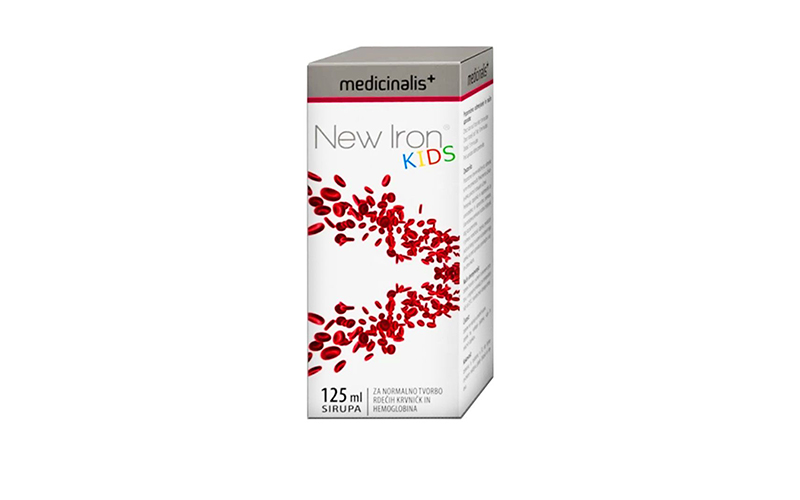New Iron® Kids
Innovative, superior iron bisglycinate chelate complex with addition of Vitamin B12, folic acid, Vitamin C, and chamomile extract, in the form of syrup, intended for use by children older than 3 years
New Iron Kids
New Iron® Kids is innovative, superior iron bisglycinate chelate complex with addition of Vitamin B12, folic acid, Vitamin C, and chamomile extract, in the form of syrup, intended for use by children older than 3 years.
New Iron® Kids has the following superior characteristics:
- iron bisglycinate molecules are small and stable, with no ionic charge, which makes this complex resistant to the impact of gastric acid and enzymes, so interactions with food, vitamins, and minerals are avoided, and there are no gastrointestinal (GIT) side effects (nausea, vomiting, constipation, stool color change, etc.)
- 70-75% better absorption and 4 times higher bioavailability compared to ferrous sulfate and ferrous fumarate iron formulations – New Iron® Kids does not inhibit the absorption of other vitamins and minerals
- New Iron® Kids achieves rapid effects on increasing the level of hemoglobin in the blood, but also on filling iron stores
- New Iron® Kids, in addition to iron, also contains folic acid and Vitamin B12. Anemia is caused by a lack of iron, folic acid, and Vitamin B12, so all three components must be taken at the same time
- New Iron® Kids also contains Vitamin C, which additionally increases the absorption of iron
New Iron® Kids composition
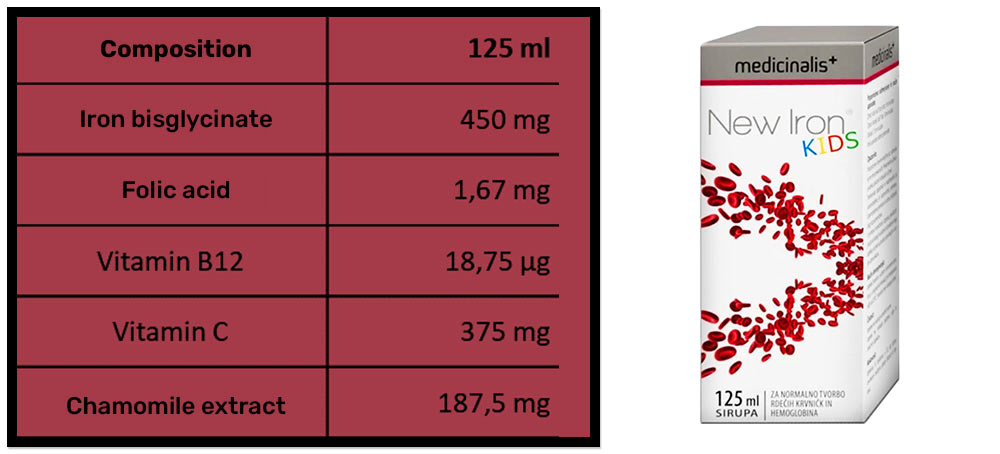
Iron bisglycinate chelate complex – the best choice for younger children with anemia due to high bioavailability and good tolerability
Folic acid – boosts the process of blood formation and tissue development in pregnancy. Reduces tiredness and fatigue
Vitamin B12 – boosts the formation of red blood cells, cell proliferation, normal metabolism, boosting energy and immune system function
Vitamin C – increases the absorption of iron and boosts the normal functioning of the immune system, reduces tiredness and fatigue
Chamomile extract – has a soothing effect on the throat, an antiseptic effect on the respiratory tract, and helps with indigestion and flatulence
Comparative study of iron bisglycinate and iron sulfate in 40 children with anemia aged 6-36 months:
I group of respondents was treated with iron bisglycinate 5 mg/kg for 28 days
II group of respondents was treated with iron sulfate 5 mg/kg for 28 days
Study results:
- both groups of respondents had a significant increase in hemoglobin (P < 0,001)
- only the group of respondents treated with iron bisglycinate chelate complex had a significant increase (P < 0,005) in plasma ferritin
Iron bioavailability calculations for two groups of respondents
Bioavailability of iron
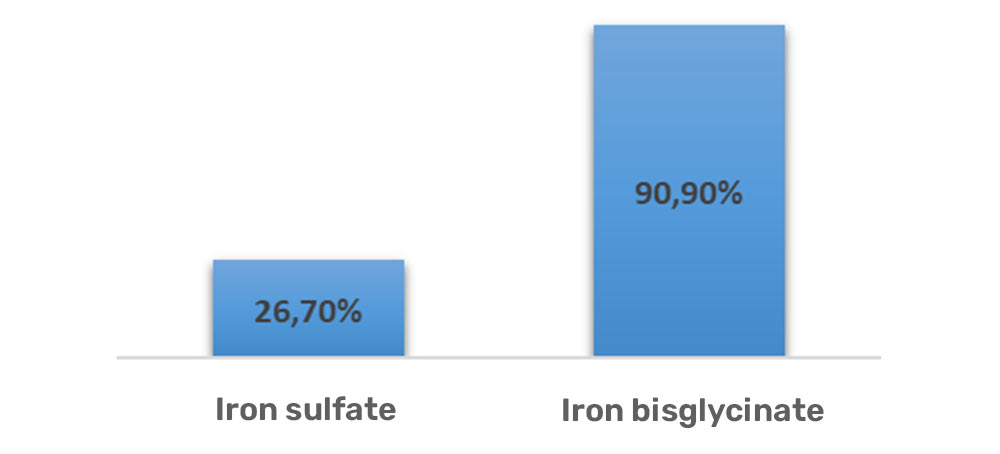
Iron bisglycinate had four times greater bioavailability!
Anemia in children
Anemia is defined as a reduced number of red blood cells (erythrocytes) or a reduced level of hemoglobin count in the blood. In addition to iron deficiency, anemia can also be caused by a lack of Vitamin B12 and folic acid, hence for proper therapy it is necessary to supplement all three micronutrients.
According to the WHO criteria, anemia in children of different ages is defined as a hemoglobin concentration (Hb) in the blood lower than:
- Children from 6 months to 5 years old: Hb concentration lower than 110 g/l
- Children from 5 to 12 years old: Hb concentration lower than 115 g/l
- Children from 12 to 15 years old: Hb concentration lower than 120 g/l
Sideropenic anemia
Sideropenic anemia is the most common form of anemia that occurs when the body does not have enough iron to produce hemoglobin in red blood cells.
The main causes of this anemia in children are:
- increased need – especially in children during the period of intensive growth and development
- inadequate nutrition and reduced intake of foods rich in iron
- gastrointestinal (GIT) diseases that lead to malabsorption of iron
- reduced production of erythrocytes
- increased iron deficiency from blood loss
Iron deficiency is the most common nutritional deficit, according to the WHO data, 40% of children suffer from sideropenic anemia.
Consequences of iron deficiency
Lack of iron in the body can have numerous adverse consequences for the child:
- inadequate growth and development
- inadequate growth of the nervous system
- inadequate functioning of the immune system
Before the actual iron deficiency (anemia) develops, there is a so-called marginal iron deficiency (iron stores are depleted, but the hemoglobin level is normal), which results in a series of non-specific symptoms and is often unrecognized.
Only when a manifest iron deficiency occurs do the symptoms that are characteristic of anemia appear (paleness, loss of appetite, weakness, dry skin, frequent infections, poor appetite, hyperventilation, shortness of breath…) Children suffering from anemia look tired, they are lethargic, have dark circles under their eyes, and are not thriving. If left untreated, symptoms of severe anemia include hyperventilation and rapid heart rate, irritability, swelling of the arms and legs, jaundice, and an enlarged spleen.
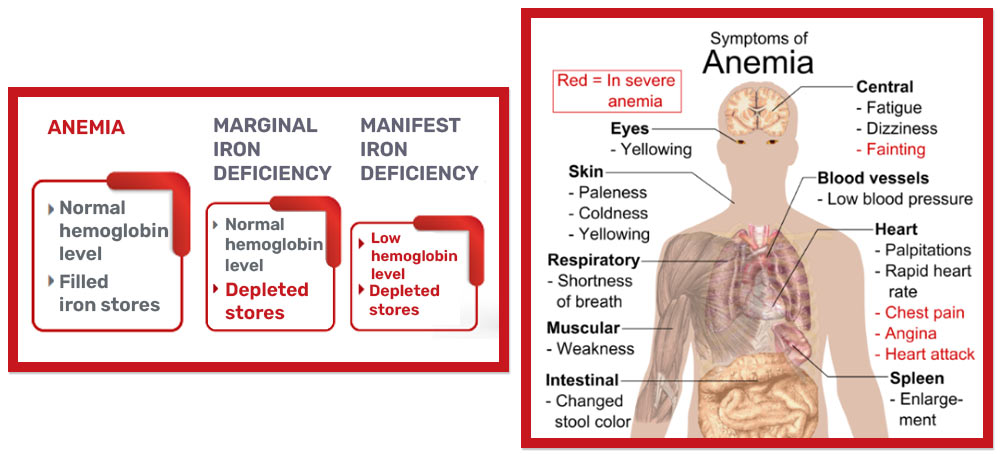
Anemia therapy involves taking oral iron preparations, and according to the NICE recommendations, it is necessary to take iron preparations for at least 3 months after normalizing the level of hemoglobin in the blood.
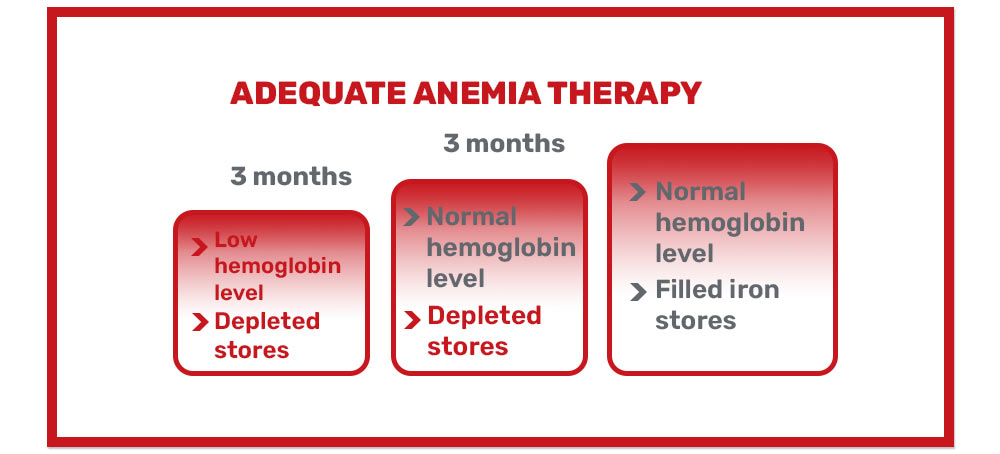
Write to us
Mosorska 9, 11000 Belgrade, Serbia
Vemax011 Pharma doo representative office Northern Macedonia - Dane Krapcev 13, Skopje
Vemax011 Pharma doo representative office Montenegro - Topliški put 1, Budva
Vemax011 Pharma doo representative office Bosnia and Hercegovina - Vlakovo 252, Sarajevo
+381 (0)63 103 00 08
office@vemaxpharma.rs
Vemax Pharma - your trusted regional partner on the road to health!

